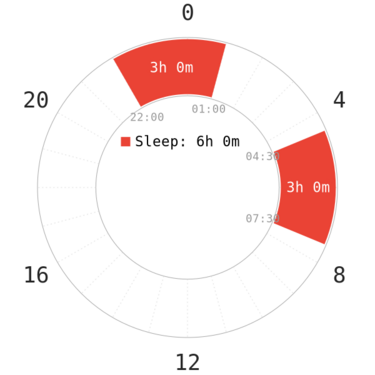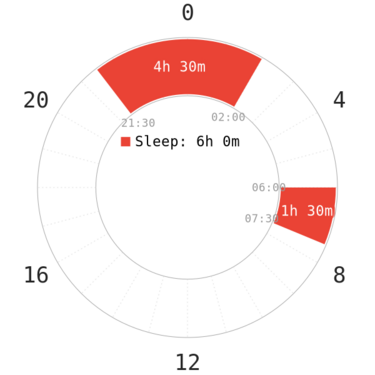Segmented/ru: Difference between revisions
Updating to match new version of source page |
Updating to match new version of source page |
(No difference)
| |
Latest revision as of 23:27, 12 April 2025
| Сегментированный | |
|---|---|
| ссылка на napchart
| |
| Время сна | 7 часов |
| Предложено | Нет, используется людьми на протяжении всей истории. |
| Сложность | Умеренная |
| Особенности | 2 длинных ядра ночью, выровненных по пикам SWS и REM соответственно. |
Сегментированный - это бифазный график, состоящий из двух ядер ночью, обычно с общим временем сна, близким к личному базовому уровню на монофазном режиме.
Происхождение
Сегментированный сон является одним из исходных полифазных режимов. Это основа линейки расписаний Dual core. Этот режим был широко распространен в обществе до появления электрического освещения. Современные исследования установили, что при сокращенном фотопериоде (более коротком световом дне) без искусственного электрического освещения человеческий сон естественно сегментирован[1].
Люди часто ложились спать через некоторое время после захода солнца, просыпались через несколько часов, бодрствовали пару часов, а затем снова ложились спать до восхода солнца. Некоторые люди с естественной склонностью к сегментированному сну сообщали, что регулярно просыпались посреди ночи. В подобном случае хорошим выбором будет перейти на сегментированный режим сна.
Механизм
Полифазное сообщество в Discord сделало несколько предположений о механизме сегментированного сна. Данный режим во многом основан на пиках сна. В ранние часы ночи (~21-24), когда начинается естественная секреция мелатонина, можно эффективно получить SWS. Согласно показаниям ЭЭГ адаптированных полифазников, первое ядро обычно насыщено SWS, тогда как второе содержит в основном REM. Таким образом, разделенные ядра более плотно вмещают жизненно важные стадии сна, что позволяет немного сократить общее время сна при стабильном режиме. При подобном графике можно обойтись без дневного нэпа, поскольку довольно длинные ядра ночью сохраняют достаточно легкого сна для поддержания бодрствования днем.
Оба ядра по умолчанию составляют 3,5 часа. Изначально было предположено, что при такой длине что циклы сна расширяются примерно до 105 минут по сравнению с ~90-минутными циклами при монофазном сне. Это также объяснило бы жизнеспособность графика, несмотря на меньшее количество циклов. Однако недавно показания ЭЭГ некоторых участников сообщества показали обратное.
Промежуток бодрствования между двумя ядрами должен составлять не менее 90 минут, при этом часто рекомендуется оставлять более длительный промежуток (~2,5–3 часа). Причина этого в том, чтобы не дать ядрам стать прерванным сном и предотвратить трудности с засыпанием или недостаточной продуктивностью.
Адаптация
Для тех, кто склонен к сегментированному сну, адаптация обычно проста. В обратном случае, она может быть труднее адаптации к Сиесте или E1. Просыпаться после первого ядра и бодрствовать ночью может быть трудным. Со временем при неукоснительном соблюдении графика эти проблемы должны исчезнуть.
После сегментированного можно пойти по пути постепенной адаптации к графикам линейки Dual core, а также Triphasic, поскольку вы приобрели привычку разделения ядер.
Сложность
Уровень сложности сегментированного сна зависит от человека и от общего количества сна на графике. В целом, он считается дружелюбным графиком для новичков.
Варианты
Хотя вариант с двумя 3,5-часовыми ядрами по умолчанию имел наибольший успех, несколько других комбинаций также возможны и имели истории успешных адаптаций в прошлом. Новички могут попробовать эти варианты с некоторыми предосторожностями.
Общее время сна 6 часов
Этот модифицированный вариант имел определенный успех. Поскольку общее время сна составляет всего 6 часов, он может быть подходящим для тех, чья потребность во сне на монофазном режиме немного ниже среднего (~7 часов). Одной из проблем на этом графике может быть сонливость в полдень из-за отсутствия нэпов. Из-за того, что график содержит меньше легкого сна, чем стандартный, бодрствовать может быть труднее.
Промежуток бодрствования между ядрами должен составлять не менее 4 часов для более эффективного покрытия пиков SWS и REM, а также для сокращения продолжительности дневного промежутка. Адаптация может быть более сложной, чем стандартная, из-за сокращения времени сна. Преимущество заключается в дополнительном времени бодрствования ночью и отсутствии нэпов днем.
Разница между распределением ядер 4.5–1.5 и 3–3 состоит в том, что те, у кого выше потребность в SWS, могут попробовать первый вариант, в то время как те, кому требуется примерно одинаковое количество REM и SWS, могут выбрать второй. В целом вариант 3–3 лучше уравновешивает стадии сна и в целом имеет больше успеха, чем вариант 4.5–1.5.
Расширенный/Не сокращающий сон
Также можно расширить этот график, возможно, до такой степени, что он не будет сокращать продолжительность сна по сравнению с исходным сном на монофазном режиме. Это позволяет легко адаптироваться, сохраняя при этом некоторые преимущества сегментированного сна. Эти графики также могут быть полезны тем, у кого повышенная потребность во сне (~9 часов на монофазном режиме), несовершеннолетним и тем, кто регулярно выполняет интенсивные упражнения.
Неравномерная длина ядер
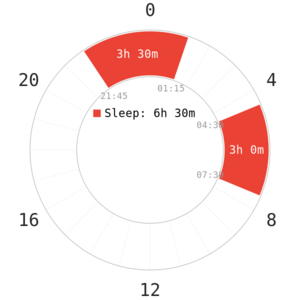
Этот вариант, который редко используется, имеет ядра разной длины. Подобные графики позволяют иметь немного больше дополнительного времени, их проще вписать в ежедневное расписание, и адаптация к ним является ненамного сложнее. Другие возможные комбинации включают 3-3.5 или даже 4.5-2.5 и 5-1.5. Тем не менее, было бы полезно знать ваши потребности в REM и SWS перед тем, как выбирать любой из этих вариантов.
Как правило, варианты с более длинным первым ядром позволяют проще бодрствовать во время промежутка между ядрами. Однако чем длиннее первое ядро, тем меньше график становится «DC-подобным», поскольку стадии сна становятся менее четко распределенными между двумя ядрами. Вариант с более длинным первым ядром также может напоминать Сиесту.
Позднее первое ядро

Для попытки адаптироваться к этому режиму рекомендуется иметь пониженную потребность в SWS и/или много полифазного опыта, такого как строгое управление питанием, физической активностью и освещением. Этот вариант обычно не рекомендуется, поскольку нахождение первого ядра вдали от пика SWS резко увеличивает сложность. Рекомендуется управление циркадным ритмом, как и для других графиков с поздним ядром.
Для этого варианта промежуток бодрствования между ядрами может быть короче из-за большего давления SWS перед вторым ядром.
Гибрид Сиесты
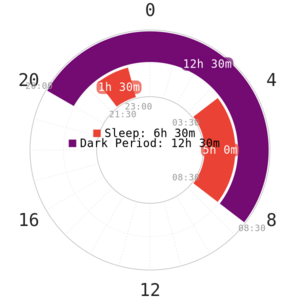
Идея этого варианта похожа на Сиесту, но с обоими ядрами ночью, при этом короткое ядро обеспечивает большую часть SWS. Те, чья потребность в SWS ниже среднего, и те, кто просто хотел бы меньше спать в вечерние часы, могут попробовать этот вариант.
Было зарегестрировано как минимум 2 успешные адаптации к этому графику; одна из попыток была зимой, когда световой день становится короче. Первое ядро намного короче второго и состоит только из одного цикла, в то время как второе ядро намного длиннее для компенсации. Подобная идея может быть применена к варианту 2.5-4.5 и другим.
Основная проблема заключается в том, что при среднестатистической потребности в SWS (около 90 минут), первого ядра будет недостаточно, чтобы получить весь SWS, поэтому остаток должен быть получен во втором ядре, и при размещении его слишком поздно процесс может быть затруднен.
Подобно стандартному графику, этот вариант также отнимает часть социального времени вечером в обмен на время бодрствования между ядрами.
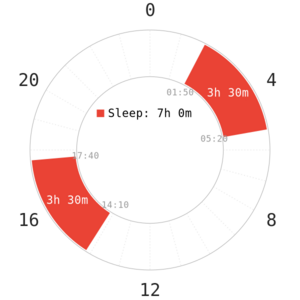
В качестве альтернативы, сегментированный может иметь одно ядро ночью, а второе - днем. Пока что известно мало историй успешной адаптации к подобному графику. Этот вариант похож на Сиесту с длинным дневным ядром, и оба ядра пропускают пики. Темный период должен начинаться за 2-3 часа до ночного ядра и продолжаться ~2 часа после него для стабилизации циркадного ритма.
Адаптация к этому варианту обычно намного сложнее, чем стандартная, потому что пропуск обоих пиков сна может значительно ухудшить качество сна. В ходе адаптации бодрствовать ночью и в утренние часы будет сложно, а длительный дневной сон может нарушить циркадный ритм.
Ночная смена
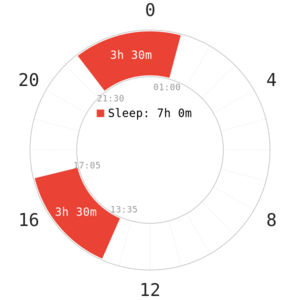
Идея состоит в том, чтобы разместить оба ядра перед работой. В качестве альтернативы дневное ядро может быть раньше, чтобы оно было вскоре после работы. Об этом варианте расписания известно немного, и адаптации в целом оказались неудачными из-за необходимого для этого большого сдвига циркадного ритма.
Было несколько неудачных попыток адаптироваться к сегментированному сну при работе в ночную смену. Это ожидаемо, поскольку в целом показатели успешности адаптации работников третьей смены очень низки.
Образ жизни
Сегментированный, который имеет ряд вариантов, может подойти многим. Он имеет множество преимуществ для тех, кто просыпается ночью естественным образом, а также позволяет придерживаться полифазного сна, даже если ваш график не позволяет спать днем.
Перед тем, как перейти на сегментированный, важно составить план того, что вы будете делать ночью. Иначе, при отсутствии дел и скуке, бодрствовать может быть сложно во время адаптации. Хотя для тех, кто склонен к сегментированному сну, это не проблема. Вот несколько советов:
- Составьте список занятий или задач, которые лучше всего выполнять в ночное время. Это включает в себя развлечения! Пребывание в одиночестве также иногда может быть преимуществом. Обязательно учтите, что эти часы должны быть проведены в темном периоде, во время которого рекомендуется носить красные очки, из-за чего вы не сможете различать цвета.
- Посвятите время уходу за собой. Промежуток между ядрами может быть полезен для расслабления после долгого рабочего дня. Это может включать аутогенные тренировки, медитацию, йогу или растяжку. Учтите, что это может повысить сложность бодрствования во время адаптации.
- Планируйте свой день. У людей часто много работы и занятости. Независимо от того, сколько дополнительного времени бодрствования вы получите, управление им всегда важно.
Преимущества сегментированного сна по сравнению с другими расписаниями включают:
- Сегментированный - единственное расписание, которое легко позволяет более 12 часов непрерывного бодрствования без необходимости дремать. Это может позволить многим людям, которые не могут вздремнуть днем, придерживаться полифазного сна.
- Сегментированный имеет относительно высокое общее время сна, что позволяет запланировать первое ядро немного позже, чем обычно, в ~23, чтобы иметь больше вечернего времени для социальной жизни. Единственное, что следует отметить, - это то, что при смещении графика второе ядро будет заканчиваться поздно утром, что может помешать вашей утренней деятельности.
- Сегментированный может стать немного гибким после адаптации. Некоторые опытные полифазники сообщили, что хотя бы одно из их ядер гибкое. Гибкость ядер дает больше свободы в управлении длиной ночного промежутка бодрствования. Например, в дни, когда вам нечем заняться ночью, второе ядро может начаться немного раньше, и наоборот. Когда происходят внезапные события, при которых возникает необходимость пропуска сна, Сегментированный также позволяет впоследствии относительно быстро восстановиться.
- Сегментированный сон, особенно расширенный вариант с более длинным первым ядром, может поддерживать интенсивные физические упражнения.
- Полифазники часто сообщают о ярких сновидениях на этом режиме, большинство из которых приходятся на второе ядро.
Примечания
- ↑ Wehr TA (1992). "In short photoperiods, human sleep is biphasic". Journal of Sleep Research. 1 (2): 103–107. doi:10.1111/j.1365-2869.1992.tb00019.x.
